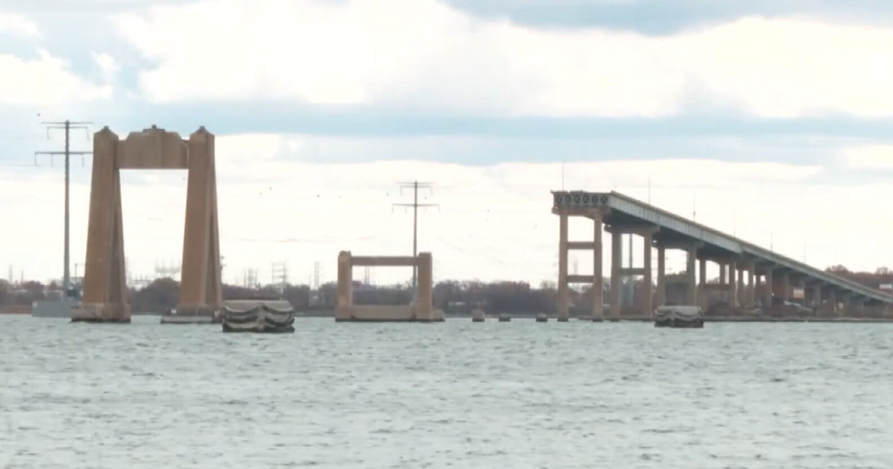Will Trump try to pull Key Bridge funding? Transportation Secretary concerned about cost, timeline, DEI mandates

U.S. Transportation Secretary Sean Duffy expressed concerns Friday about the Francis Scott Key Bridge rebuilding project and has asked for a meeting with Maryland Gov. Wes Moore.
The Key Bridge collapsed into the Patapsco River on March 26, 2024 after being struck by a cargo ship. Six men who had been working on the bridge were killed.
In a letter to Moore delivered Friday, Duffy raised concerns from the Trump administration over project costs, the overall proposed project budget and timeline, and the use of diversity, equity and inclusion (DEI) policies in awarding contracts for the bridge rebuild project.
Duffy raises Key Bridge rebuild concerns
“Congress granted the Secretary of Transportation important authorities to conduct critical oversight to ensure that federal highway funds are properly managed, and I take this authority seriously,” Duffy wrote. “It is my role to guarantee that federally funded projects benefit the entire nation through every dollar spent.”
“I am particularly interested in how the State of Maryland plans to achieve key delivery metrics for the FSK Bridge replacement project, including MDOT’s estimates of a $1.8 billion project cost and the 2028 expected completion date,” he said.
Duffy added that he was concerned about what he called “unconstitutional” DEI contracting practices. Specifically, Duffy pointed to the U.S. Department of Transportation’s (USDOT) Disadvantaged Business Enterprise (DBE) program.
In January, the Maryland Transportation Authority set a 31.5% participation goal for USDOT eligible disadvantaged businesses in its engineering consultant contract. To be considered a disadvantaged business under the DBE program, a business must be a small, for-profit small company that is majority-owned and operated by people who are socially and financially disadvantaged.
“One additional area of specific concern relates to whether Maryland intends to award contracts for the FSK Bridge project in a manner that relies on the race or sex of contractors. Any reliance on race or sex-conscious factors in contracting decisions could introduce significant legal vulnerabilities and inefficiencies in the management of the project,” Duffy wrote to Moore.
In a statement released in response, Gov. Moore did not address the Trump administration’s DEI concerns.
“We will continue to work with the Trump Administration to find ways to reduce costs and rebuild faster,” the governor wrote. “We anticipate the price estimation process to be finalized in the coming months and we will provide regular updates.”
Moore added that the state will, “continue to pursue litigation and make substantial financial contributions by way of advance construction costs and insurance settlement dollars to keep the project moving.”
“The safety of the bridge and the sound stewardship of taxpayer dollars remain our top priority as we work to fully restore economic vitality—not only to the Port of Baltimore and the State of Maryland, but for the people across the country,” Moore said.
Maryland leaders discuss Key Bridge rebuild cost
The governor and several members of Congress toured the Key Bridge construction site early last month in hard hats and safety vests.
They said at the time that federal funding is secure.
“Those funds are set in stone,” Senator Chris Van Hollen told WJZ on August 4. “They’re set in statute, and I’m glad that they also give this project and everybody involved the certainty that those monies will be there as they need them.”
However, tariffs could drive up the price of steel and other raw materials.
“Cost, schedule, is being looked at. You can tell that we’re discovering a lot of things as we go along,” said Bruce Gartner, the Executive Director of the Maryland Transportation Authority. “Tariffs and just the supply chain issues, generally all those things factor into the cost.”
Rebuilding the Francis Scott Key Bridge is budgeted to cost approximately $2 billion and be completed by the end of 2028.
In December 2024, Maryland lawmakers announced that the federal government would cover the full cost of the rebuild.
U.S. Senators Chris Van Hollen and Ben Cardin said the funding for the Key Bridge rebuild was wrapped into the last year’s federal spending bill, known as a continuing resolution, which keeps the government operating.
Will the Trump administration pull Key Bridge funding?
President Trump has recently been at odds with Governor Moore, sparring over crime concerns in Baltimore, which has led to discussions about whether the president would withdraw funding for the Key Bridge rebuild.
During an August press conference, Mr. Trump said Baltimore was “so far gone,” as far as crime is concerned. Moore responded to what he deemed “insults from the Oval Office,” by inviting the president to Baltimore for a public safety walk. Mr. Trump said Moore should “clean up this crime disaster” before he would visit the city.
Days later, Mr. Trump posted on Truth Social, “I gave Wes Moore a lot of money to fix his demolished bridge. I will now have to rethink that decision???”
A day later, when a Forbes reporter asked President Trump if his reconsideration of Key Bridge funding was contingent on Moore “cleaning up the streets,” the president said, “No, we were very generous to him on a bridge, you know, a boat ran into a bridge and the bridge came down like I’ve never seen.”



